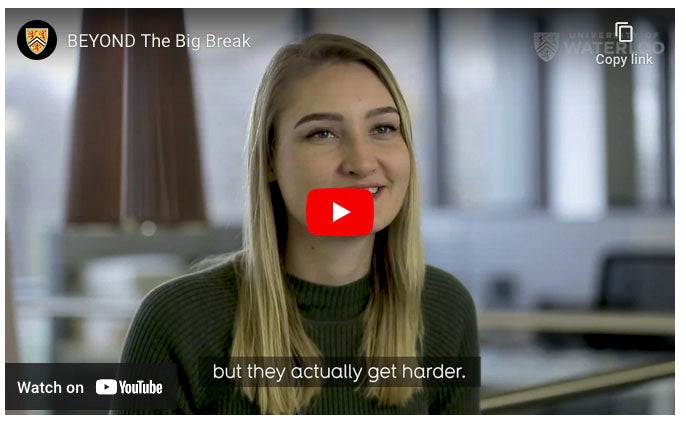Editor:
Brandon Sweet
University Communications
bulletin@uwaterloo.ca
Beyond Tradition documentary examines Waterloo's history
University Relations is proud to present Beyond Tradition, an 11-minute documentary capturing the University of Waterloo’s unique history. At the centre of the film is Ken McLaughlin (BA ’65), Waterloo alumnus turned distinguished professor emeritus. Ken was part of the University’s second graduating class in 1965 and then returned as a lecturer in the history department from 1970 to 2008.
Over the years, Ken has dedicated many years documenting and preserving Waterloo’s history through published books, articles and presentations. Ken’s first-hand accounts take viewers on a walk through time, highlighting Waterloo’s progressive beginnings that went on to change the post-secondary world forever.
A special thanks to the numerous people and stakeholders who helped bring this project to life, including:
- Ken McLaughlin
- Sandbox - La Boîte à Films
- Chris McCorkindale and Sue Breen (McCorkindale Advertising & Design)
- Faculty communicators
- Nick Richbell and Sue Plouffe (University of Waterloo Special Collections & Archives)
- Office of Advancement
- Office of Commercialization
- Office of Research
- Velocity
- Waterloo Indigenous Student Centre

Scale-up helps pro-athletes (and entrepreneurs) stay in the game
This article was originally published on Waterloo Stories.

Alexa Roeper caught a couple of breaks taking her HealthTech company, Penta Medical, from idea to startup to a successful business — literal breaks actually. The first came when a broken foot inspired Roeper to invent a product to help people to heal faster. The second came when a well-known athlete’s broken bone helped launch her company internationally.
“I started doing my own research on how I could recover faster because I wanted to get back to my training schedule,” Roeper says, an equestrian. She discovered that the best treatments all required patients to spend a prohibitive amount of time in clinics. “Most can’t just leave work every day to go to the physiotherapist for several hours.”
That got her thinking about wearable medical devices. Roeper hit upon the notion of creating a software-enabled, lightweight, wearable laser therapy device. She wanted to create something that people could strap on while they go about their day, have it deliver therapy and monitor the individual’s healing progress as it is worn.
Roeper, at the time a biomedical sciences student at the University of Waterloo, teamed up with Daniel Choi, a Waterloo mechatronics engineering alumnus, to design the hardware. They also employed a developer to make device software and an app to monitor the healing process.
Waterloo’s Velocity program and Accelerator Centre, as well as Silicon Valley’s famed Y Combinator, were all stops along the way to where Penta is now — an international HealthTech company supplying the only portable cold laser therapy device clinically proven to heal injuries.
But that’s not where the story ends. Inventing the device turned out to be the easy part. Scaling-up and managing a surging business requires a whole new suite of tough decisions to be made.

It's Staff Appreciation Week at the W Store and other notable notes

